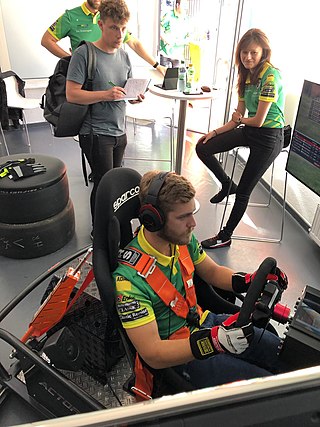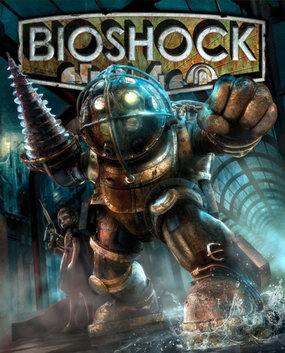A gamer is a proactive hobbyist who plays interactive games, especially video games, tabletop role-playing games, and skill-based card games, and who plays for usually long periods of time. Some gamers are competitive, meaning they routinely compete in some games for money, prizes, awards or the mere pleasure of competition and overcoming obstacles. In some countries such as the UK and Australia, the term "gaming" can refer to legalized gambling, which can take both traditional and digital forms, through online gambling. There are many different gamer communities around the world. Since the advent of the Internet, many communities take the form of Internet forums or YouTube or Twitch virtual communities, as well as in-person social clubs. Originally a hobby, it has evolved into a profession for some. In 2021, there were an estimated 3.24 billion gamers across the globe.

System Shock 2 is a 1999 action role-playing survival horror video game designed by Ken Levine and co-developed by Irrational Games and Looking Glass Studios. Originally intended to be a standalone title, its story was changed during production into a sequel to the 1994 game System Shock. The alterations were made when Electronic Arts—who owned the System Shock franchise rights—signed on as publisher.

Mario Party is a party video game series featuring characters from the Mario franchise in which up to four local players or computer-controlled characters compete in a board game interspersed with minigames. The games are currently developed by NDcube and published by Nintendo, being previously developed by Hudson Soft. The series is known for its party game elements, including the often unpredictable multiplayer modes that allow play with up to four, and sometimes eight, human players or CPUs.
A single-player video game is a video game where input from only one player is expected throughout the course of the gaming session. A single-player game is usually a game that can only be played by one person, while "single-player mode" is usually a game mode designed to be played by a single player, though the game also contains multi-player modes.

Simulated racing or racing simulation, commonly known as simply sim racing, are the collective terms for racing game software that attempts to accurately simulate auto racing, complete with real-world variables such as fuel usage, damage, tire wear and grip, and suspension settings. To be competitive in sim racing, a driver must understand all aspects of car handling that make real-world racing so difficult, such as threshold braking, how to maintain control of a car as the tires lose traction, and how properly to enter and exit a turn without sacrificing speed. It is this level of difficulty that distinguishes sim racing from arcade racing-style driving games where real-world variables are taken out of the equation and the principal objective is to create a sense of speed as opposed to a sense of realism.

The Duel Masters Trading Card Game is a two-player or two vs. two team collectible card game (CCG) jointly developed by Wizards of the Coast and Takara Tomy. The card game is part of the Duel Masters franchise.

An online game is a video game that is either partially or primarily played through the Internet or any other computer network available. Online games are ubiquitous on modern gaming platforms, including PCs, consoles and mobile devices, and span many genres, including first-person shooters, strategy games, and massively multiplayer online role-playing games (MMORPG). In 2019, revenue in the online games segment reached $16.9 billion, with $4.2 billion generated by China and $3.5 billion in the United States. Since 2010s, a common trend among online games has been operating them as games as a service, using monetization schemes such as loot boxes and battle passes as purchasable items atop freely-offered games. Unlike purchased retail games, online games have the problem of not being permanently playable, as they require special servers in order to function.

Irrational Games was an American video game developer founded in 1997 by three former employees of Looking Glass Studios: Ken Levine, Jonathan Chey, and Robert Fermier. Take-Two Interactive acquired the studio in 2006. The studio was known for its games System Shock 2, Freedom Force, SWAT 4, and most notably, two of the games in the BioShock series. In 2014, following the release of BioShock Infinite, Levine opted to significantly restructure the studio from around 90 to 15 employees and focus more on narrative games. In February 2017, the studio announced that it had been rebranded as Ghost Story Games and considered a fresh start from the original Irrational name, though still operating at the same business subsidiary under Take-Two.

Suikoden II is a role-playing video game developed and published by Konami for the PlayStation video game console and the second installment of the Suikoden video game series. It was released in late 1998 in Japan, 1999 in North America, and in 2000 in Europe. The game features a vast array of characters, with over 100 recruitable characters, of which over 40 are usable in combat.

BioShock is a 2007 first-person shooter game developed by 2K Boston and 2K Australia, and published by 2K Games. The first game in the BioShock series, it was released for Microsoft Windows and Xbox 360 platforms in August 2007; a PlayStation 3 port by Irrational, 2K Marin, 2K Australia and Digital Extremes was released in October 2008. The game is set in 1960, and follows Jack who discovers the underwater city of Rapture. Built by business magnate Andrew Ryan to be an isolated utopia, the discovery of ADAM, a genetic material which grants superhuman powers, initiated the city's turbulent decline. Jack attempts to escape, fighting ADAM-obsessed enemies and Big Daddies, while engaging with the few sane humans that remain and learning of Rapture's past. The player, as Jack, can defeat foes in several ways by using weapons, utilizing plasmids that give unique powers, and by turning Rapture's defenses against them.

A cattle prod, also called a stock prod or a hot stick, is a handheld device commonly used to make cattle or other livestock move by striking or poking them. An electric cattle prod is a stick with electrodes on the end which is used to make cattle move via a relatively high-voltage, low-current electric shock. The electric cattle prod is said to have been invented by Texas cattle baron Robert J. Kleberg, Jr. of the King Ranch around 1930, although versions were sold as early as 1917.
Stainless Games is an independent British video game developer based in Newport, Isle of Wight, that is best known for the creation of the Carmageddon franchise.

Painstation is an art object and arcade game based on Pong developed by the artists' group "/////////fur//// art entertainment interfaces", with pain feedback.

Lux-Pain is a visual novel adventure video game developed by Killaware and published by Marvelous Entertainment for the Nintendo DS video game console. The game was released in Japan on March 27, 2008. It was published in North America by Ignition Entertainment on March 24, 2009, and in Europe by Rising Star Games on March 27, 2009.

An endurance game is a game where the object is to last as long as possible under some sort of stress. The stress might be physical pain, fear, social embarrassment or any other negative sensation.
Warhammer 40,000: Dark Millennium Online was a video game to be based on Games Workshop's Warhammer 40,000 setting. It was under development by Vigil Games until THQ's closure.

Metal Gear Solid V: The Phantom Pain is a 2015 stealth game developed by Kojima Productions and published by Konami. Directed, written, and designed by Hideo Kojima, it is the ninth installment in the Metal Gear franchise, following Metal Gear Solid V: Ground Zeroes, a stand-alone prologue released the previous year. Set in 1984, nine years after the events of Ground Zeroes, the story follows mercenary leader Punished "Venom" Snake as he ventures into Soviet-occupied Afghanistan and the Angola–Zaire border region to exact revenge on those who destroyed his forces and came close to killing him during the climax of Ground Zeroes.

Metal Gear Solid V: Ground Zeroes is a 2014 stealth game developed by Kojima Productions and published by Konami. It is the eighth game in the Metal Gear series directed, written and designed by Hideo Kojima, and serves as a prologue to Metal Gear Solid V: The Phantom Pain, released the following year. Set in 1975, a few months after the events of Metal Gear Solid: Peace Walker, the story follows Snake as he infiltrates an American black site in Cuba called Camp Omega, attempting to rescue Cipher agent Paz Ortega Andrade and former Sandinista child soldier Ricardo "Chico" Valenciano Libre.

The development of BioShock Infinite began after BioShock's release in August 2007. The five-year development, led by studio Irrational Games, began under the moniker "Project Icarus". Irrational's creative lead, Ken Levine was inspired by events at the turn of the 20th century and the expansion of the concept of American Exceptionalism set by the 1893 World's Fair in Chicago. His story took these events to create a tale set in 1912 where the player, as former Pinkerton agent Booker DeWitt, is challenged to rescue a young woman, Elizabeth, who has been kept aboard the floating city of Columbia in the middle of a civil war between its founder Father Zachary Comstock and the Vox Populi, the underclass revolting against him.

Magic Duels is a video game based on the popular collectible card game Magic: The Gathering. Magic Duels is a successor to Stainless Games' Magic: The Gathering – Duels of the Planeswalkers and its annual sequels, released from 2009 through 2014. The free-to-play title was released on July 29, 2015, shortly following the physical release of the Magic Origins core set.
















